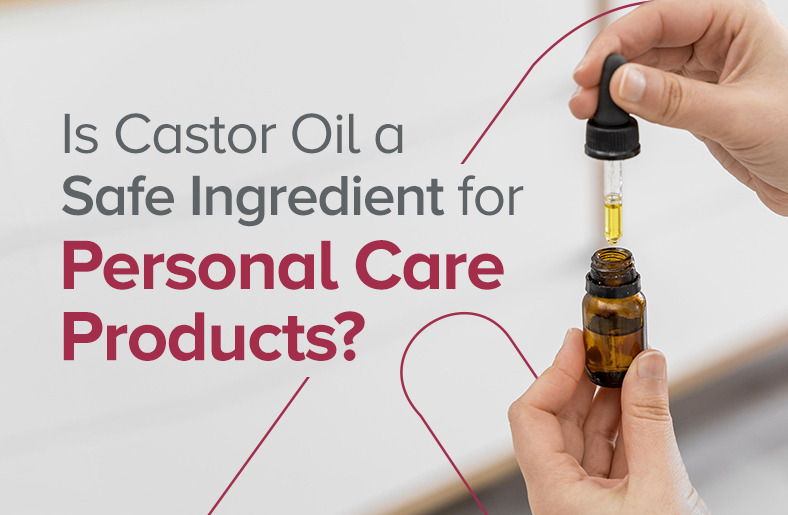Is Castor Oil a Safe Ingredient for Personal Care Products?

A household remedy in previous generations, castor oil has come out in a big way for the modern-day personal care and cosmetic products. Be it premium serums, lipsticks, hair conditioners, or moisturizers, this simple oil has stolen the centre stage of the world of beauty.
Castor oil is the perfect solution to formulation flexibility, clean-label status, and cost-effective performance in B2B cosmetic brands. It has multi-functional features, which minimize the requirement of a variety of synthetic elements in the production of a product. However, as safety, sustainability, and efficacy take on more prominence, a critical question is aching to be asked: Is castor oil really safe in the personal care industry?
Let’s dive into the safety, benefits, and science of castor oil for cosmetics, and why it is a go-to choice for personal care formulators all over the world.
Why Castor Oil is the Beauty Industry’s Best-Kept Secret?
Castor oil is a liquid extracted using the seeds of Ricinus communis plant, which is thick, has a pale yellow colour, and contains rich ricinoleic acids. It includes monounsaturated fatty acids and also possesses anti-inflammatory, antimicrobial, and moisturizing qualities.
Castor oil finds extensive usage in formulations of personal care, and it is because of:
- Emollient effect: Skin and lip softening, as well as moisture-trapping
- Viscosity control: Improves texture and spreading ability of creams and lotions
- Shine and gloss: Provides natural shine to lipstick, mascaras, and hair serums
- Stability: The product possesses long shelf life, and blends well with other ingredients
Can Castor Oil Be Used Topically?
1. Regulatory and FDA Approvals
Yes, castor oil has been generally recognized as safe (GRAS) by the FDA of the U.S. and safe to be used in food, as well as cosmetic applications. The name is also included in the “safe ingredient list” of Cosmetic Ingredient Review (CIR) professional panel, confirming that it may be used safely on skin in a non-toxic, non-sensitizing manner.
2. Non-Comedogenic and Hypoallergenic
In spite of its heavy consistency, castor oil for cosmetics is not comedogenic and thus does not clog pores. It also suits a variety of skin types, such as those of an oily skin and those that are acne prone, when used in moderate amounts.
3. Dermatologically Safe
Castor oil is also suggested by dermatologists to be used on conditions such as dry skin, eczema, and brittle hair due to its deeply penetrating nourishing properties without strong synthetic ingredients. Its soft character qualifies it to be used even on sensitive skin, such as creams used under the eyes and baby cosmetics.
Castor Oil for Cosmetics: Key Benefits
Being a reliable company in the list of castor oil suppliers, Ambuja Solvex offers grades, which are conforming to the cosmetic industry. The following are some of the applications of high-quality castor oil by the cosmetic brands:
1. Hair Care
- It grows hair by stimulating the scalp.
- Decreases the faded skin flakes and increases the hair growth.
- Applied in shampoos, conditioners, and hair serums.
2. Skin Care
- Anti-moisture, which makes it more flexible and softer.
- Decreases the level of the inflammation and calms down irritated skin.
- It is used in face oils, body lotions, and hand creams.
3. Makeup Products
- Smooth glide and moisturization used in lipsticks and lip balms.
- Used in mascaras and eyeliners because of the natural appearance of gloss and viscosity.
4. Soap Formulations
- Helps to give a rich creamy lather.
- Improves hardness and stability of soap.
- Great for natural and handmade soap bars.
Cold-Pressed Castor Oil vs Commercial Castor Oil: Which is Safer?
| Features | Cold-Pressed Castor Oil | Commercial Castor Oil |
| Extraction Method | Room temperature pressing under mechanical pressure | Solvent Extraction (e.g., hexane) |
| Chemical Residues | Non-chemical, non-toxic, and pure | Possible parabolic solvents unless finished further |
| Nutrient Content | Richness of Ricinoleic acid and antioxidant | Heating losses/solvent losses Loss of nutrients |
| Suitability | Suitable for sensitive, clean-label formulations | Commonly used within industrial/low-cost applications |
| Environmental Impact | Less environmental impact, no harmful solvents | The use of chemicals poses a concern about disposal and sustainability |
Additionally, it is projected that cold-pressed castor oil will account for 36% of the global castor oil market by 2025. This indicates the increased demand for natural, safer proportions of extraction.
Thus, cold-pressed castor oil is less harmful, since it is non-chemical and non-heated and therefore able to retain bioactive compounds and eradicate the opportunity of solvent risks. It is also highly concentrated with antioxidants, non-irritating, and apt for sensitive skin as well as organic cosmetic products.
The Role of Castor Oil in Clean Beauty and B2B Formulations
With the clean beauty movement that is redefining the personal care industry, castor oil is emerging as a pillar when brands want clean alternatives that are powerful, natural, and ethical in how they are produced. Its multiple use as an emollient, a carrier, a stabilizer, as well as gloss enhancer, makes it very appealing to formulators who want to limit the use of synthetic additions.
The cost-effectiveness, uninterrupted supply, and friendly nature of castor oil with green-label certifications make it favorable to B2B brands. As consumers start becoming increasingly aware of ingredient sourcing and product safety, castor oil is an excellent fit in terms of changing cosmetic trends. Castor oil for cosmetics is not just tradition that leads to its growth, but it fits the contemporary expectations of purity, performance, and eco-friendly production.
Why Clean Beauty Brands Trust Castor Oil from Trusted Suppliers?
Trusted castor oil supplier, like Ambuja Solvex, not only pays attention to the effectiveness of castor oil, but also to its safety and ethical nature of origin. A prevalent concern pertains to ricin, a harmful protein present in unprocessed castor seeds.. Luckily, ricin is soluble in water and is completely removed during extraction of oil. In fact, castor oil for cosmetics is 100% safe and non-toxic to use.
Also, sourcing of oil is equally important. The contemporary consumers need honesty, environmental friendliness, and ethics in production. On every front, Ambuja Solvex performs with pride:
- Organically grown castor seeds
- Ethical and traceable supply chains
- Minimal environmental footprint in processing
- Compliance with FDCA, ISOQAR, and Kosher standards
Conclusion
“Castor Oil is Not Just Safe, It’s Superior”. Yes, castor oil is both safe and extremely effective as a component to be used in personal care products. Being multipurpose, eco-friendly, and good nature content, it is one of the first options of the formulators of clean, plant-based, and high-performing cosmetic ingredients.
Being one of the renowned castor oil manufacturers, Ambuja Solvex is proud to present you with quality castor oil to satisfy your needs in the sphere of personal care products and cosmetic industries.
Castor Oil is what you need.
Contact Now!
FAQs
- Is castor oil suitable for any skin type?
Castor oil for cosmetics is generally safe on any skin type, even on the delicate and acne-prone ones. It is non-comedogenic, and it possesses anti-inflammatory properties.
- Can we make organic cosmetic products using castor oil?
Absolutely. Cold-pressed castor oil should be used to make organic and clean-label cosmetics since there are no chemicals and solvents.
- What is the cosmetic storage process of castor oil?
Keep castor oil in a cool, dark location in an air-tight container to preserve power and avoid oxidizing.
- Can castor oil expire?
Generally, castor oil can last up to 1-2 years when stored properly. Cold-pressed variants from Ambuja Solvex retain freshness longer due to fewer processing steps.

Source: Is Castor Oil a Safe Ingredient for Personal Care Products?

